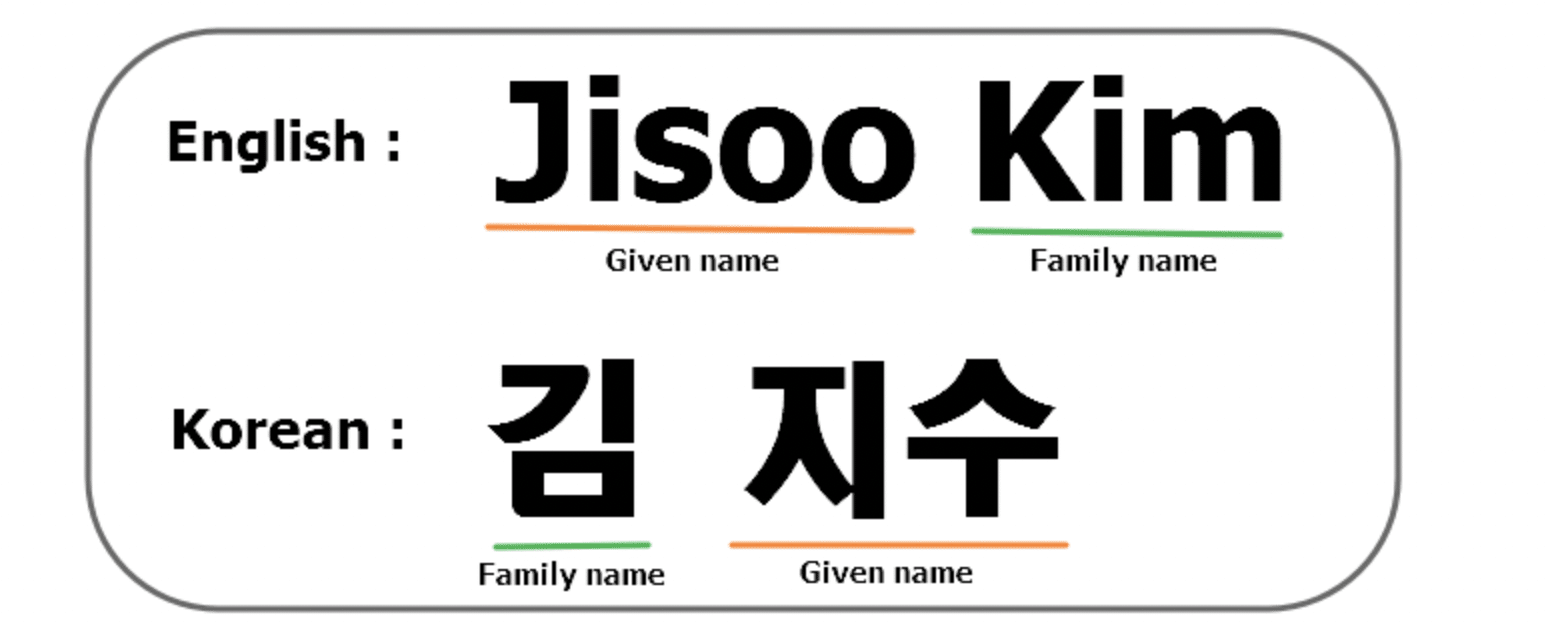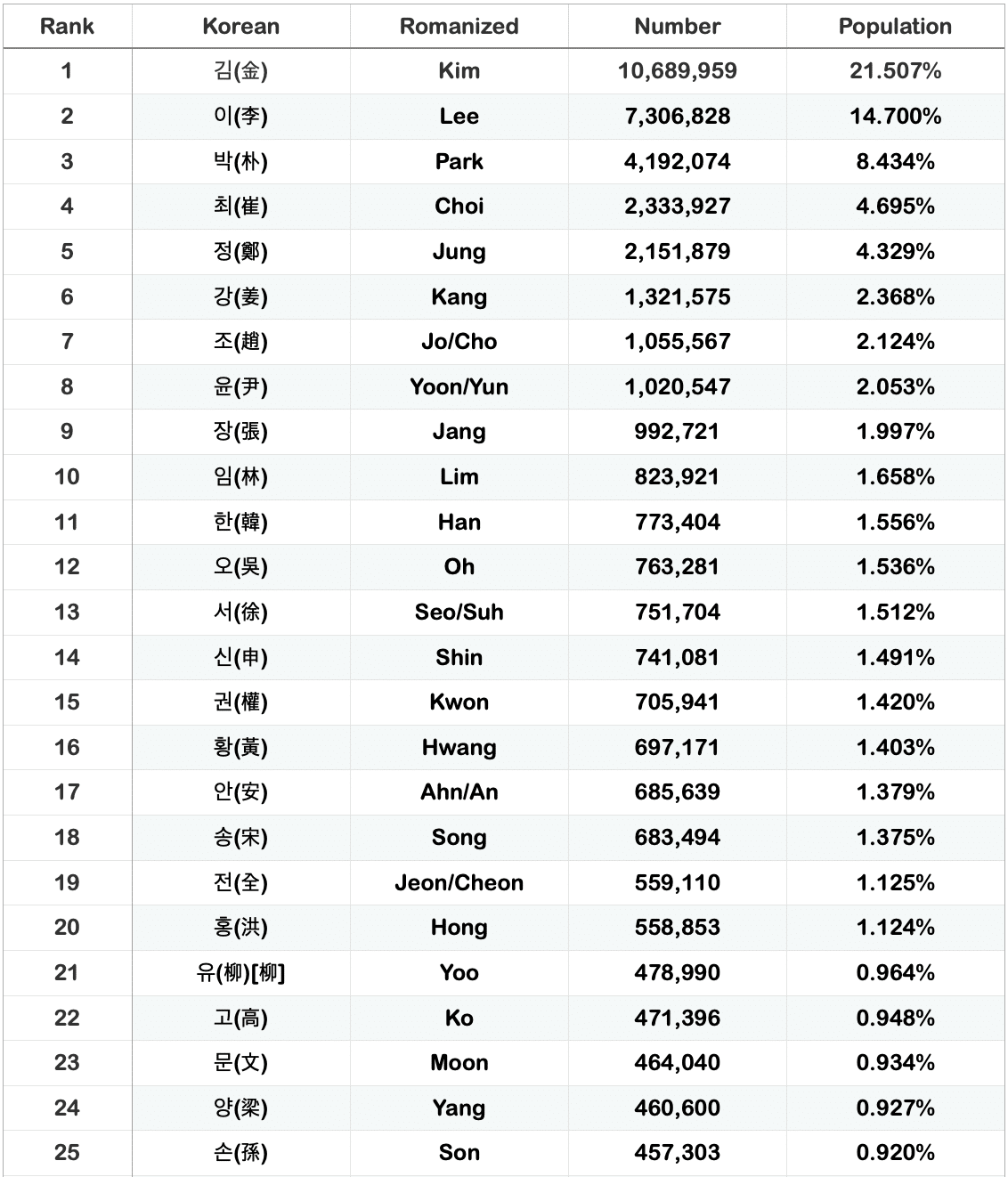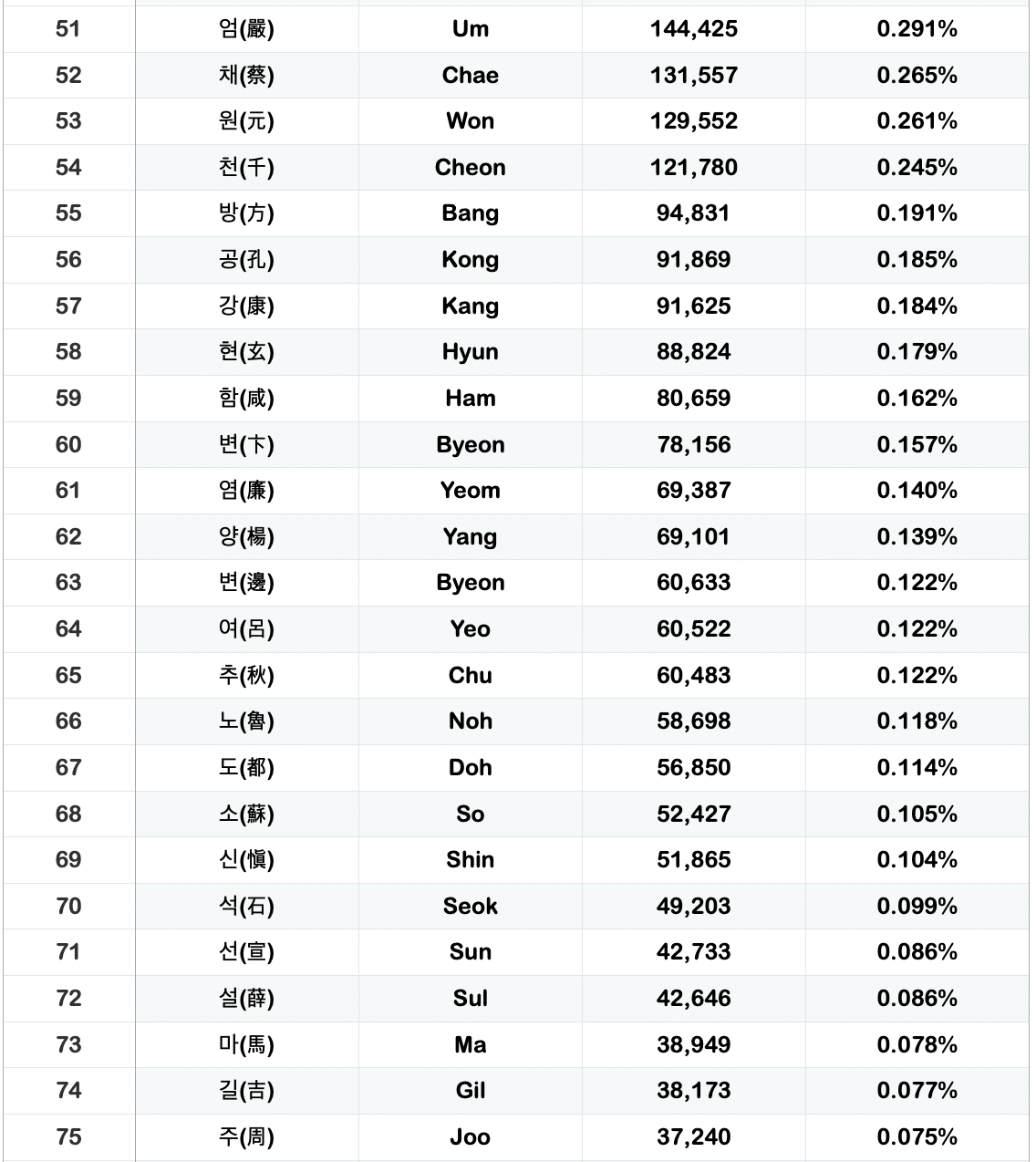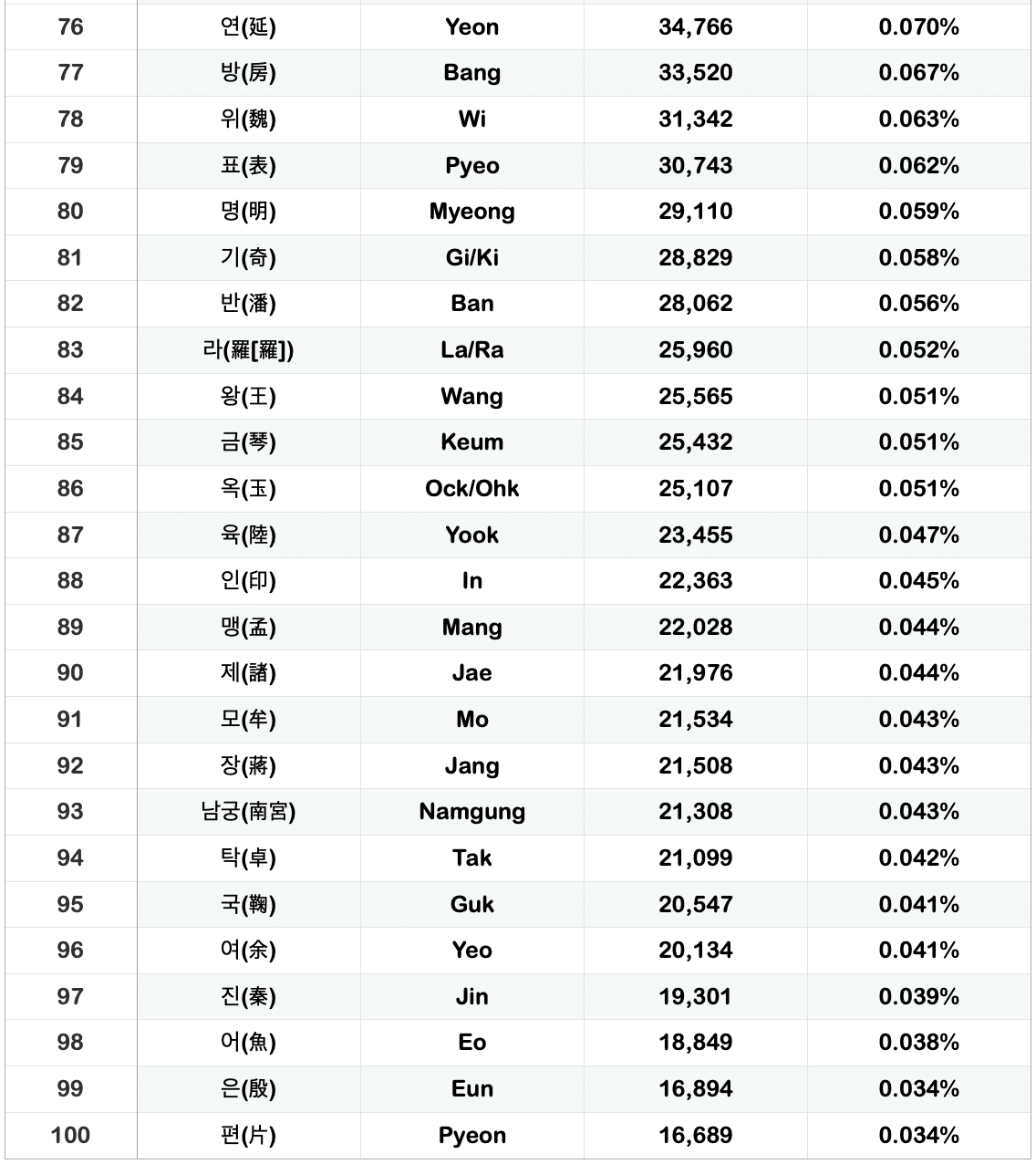Based on your encounter with Korean names, you might have been wondering if all Koreans share the same handful of last names—Kim, Lee, Park, or Choi. Diving deeper into the anatomy and conventions around Korean names, there’s a lot more that a Korean name can tell you than you think.
Korean last names or family names are often one syllable with a few exceptions, and are distinguished by bon-gwan (본관). Bon-gwan refers to the region where a clan originated. For example, the two most common Kims in Korea are Gyeongju Kim originating from Gyeongju and Gimhae Kim originating from Gimhae.
According to a recent population and housing census in 2015 by Statistics Korea, there are 286 Korean last names that branch out into 858 different clans.
What are the most popular Korean last names?
Below is a list of the top 20 most popular Korean last names and their relative percentage make-up in the Korean population, according to Statistics Korea (KOSTAT).
- Kim (김) – 21.51%
- Lee (이) – 14.70%
- Park (박) – 8.43%
- Choi (최) – 4.70%
- Jung (정) – 4.33%
- Kang (강) – 2.37%
- Cho/Jo (조) – 2.12%
- Yoon/Yun (윤) – 2.05%
- Jang (장) – 2.00%
- Lim (임) – 1.66%
- Han (한) – 1.56%
- Oh (오) – 1.54%
- Seo (서) – 1.51%
- Shin (신) – 1.49%
- Kwon (귄) – 1.42%
- Hwang (황) – 1.40%
- Ahn (안) – 1.38%
- Song (송) – 1.38%
- Jeon (전) – 1.13%
- Hong (홍) – 1.12%
How are the names ordered?
A Korean name has two parts, a family name (or the surname) and a given name. Unlike Western names, the surname traditionally precedes the given name. Surnames are inherited from the father while mothers almost always keep their maiden names after marriage.

When Korean names are romanized or used overseas, however, many individuals will choose to transpose the order for familiarity. Spacing can also be tricky when romanizing Korean letters. When writing names in Korean or Hangul, both the family and the given parts of the name are typically meant to be joined as one word without spacing. When romanized, the matter of spacing or hyphenation between letters becomes one’s personal preference, as the same name can take on multiple forms.
For instance, the name Kim Seohyeon (김서현) can also be written as Kim Seo Hyeon, Kim Seo-Hyeon, or Seo-hyun Kim. Even if Korean first names are spaced out or separated, they should always be considered to be a single name, as the concept of middle names does not really exist in Korean culture.
The AP Style of Writing Names
The official AP (Associated Press) Style Guide denotes that Korean names are to be written as two names, where the family name comes first and the given name is separated by a hyphen, followed by a lowercase letter. In the example above, the correct spelling would be Kim Seo-hyun. This is the government’s standard practice for transliterations, but again, individuals can choose to revise this default spelling based on their personal preferences.
How long are Korean names?
Another distinctive feature of Korean names is that they typically contain three syllables—one for the family name and two for the given name. With a couple of exceptions, Korean family names are generally one syllable each. While there are a few surnames that are two syllables long (such as Namkoong 남궁), these are extremely rare and are typically not purely of Korean origin. To match this three-syllable convention, families with two-syllable surnames frequently opt to give their children one-syllable first names. For instance, Namkoong Yoon or Namkoong Min is a common name among those with that family name.
The Generation Name or Dollim Ja, a Shared Syllable Among Siblings
For siblings, it’s also common to share a syllable in the given name to denote the relationship. This is called the dollimja, or generation name. Either the first or second syllable of the given name will be kept the same, and each sibling will get a unique syllable for themselves. For example, a “Kim” family with three sons may designate the last syllable of the names to be “Jun”, with each of the sons’ names being something like “Kim Young Jun”, “Kim Seo Jun”, and “Kim Sang Jun”.
This kind of naming convention dictates that the shared name is alternated every generation. For example the first syllable will be shared in one generation, the second syllable will be shared in the next generation. Also, some families use the dollimja for only the sons while other families use it for all the siblings.
These days, many families ignore the dollimja and give their children completely different names that are sometimes quite unique.
What do Korean names mean?
Aside from naming conventions, let’s delve into the meaning of Korean names. In Korean culture, names are more than just what we call each other and can symbolize different things. Traditionally, each Hangul letter of a given name has an associated meaning based on Chinese characters, Hanja . Many Korean names include letters that signify a prosperous future for the child, such as Cho (beauty), Kyeong (brightness), and Geon (strength).
Traditionally, Korean names and their meanings would have gender-associated characteristics, where female names had connotations of beauty and innocence while male names contained qualities such as strength and bravery. Korean parents may consult a shaman or so-called ‘name-giver’ to find a name that will bring good fortune, typically choosing names that hold letters related to prosperity and goodwill. For some, names may also be chosen in relation to the child’s birth date and time to ensure that it is auspicious.
These days, it has also become popular to use native Korean words as one’s given name, such as Haneul (sky), Seulgi (wisdom), and Areum (beauty). More modern families are departing from names derived from traditional Hanja and choosing more aesthetically sounding or meaningful names for their children.
Most Popular Korean Baby Names in 2022
Here is a list of the top 10 most popular Korean baby names for boys and girls in 2022 and their respective meanings in hanja:
Boys:
- 이준 Yi-jun: This name can take on many meanings depending on which hanja is used, but some common connotations for yi are happiness and endurance, while jun can mean talented or handsome.
- 서준 Seo-jun: Seo has two hanja options—one can mean felicitous or auspicious while the other can mean “to open up” or “comfortable and easy”. Jun can mean talented or handsome.
- 하준 Ha-jun: Ha means summer while jun can mean talented or handsome.
- 도윤 Do-yun: Do typically means path, road, or way, while yun means “to allow or consent”.
- 은우 Eun-woo: Eun means kindness or mercy while woo can mean house, universe, help, protect, or bless.
- 시우 Si-woo: Si means begin or start, while woo takes the meaning of “divine intervention”, protection, or rain.
- 지호 Ji-ho: This hanja combination can mean wisdom and intelligence or “tiger, brave, fierce”.
- 예준 Ye-jun: Ye can mean art, talent, and craft, while jun means talented or handsome.
- 유준 Yu-jun: This hanja combination can mean king or ruler, along with jun which means talented or handsome.
- 10.수호 Su-ho: This name typically means guardian or protector.
Girls:
- 서아 Seo-ah: Seo means “felicitous omen” or “auspicious”, while a/ah can mean beautiful, sprout, elegant, and graceful.
- 하윤 Ha-yoon: Ha can mean summer, greatness, or talent, while yoon means “to allow or consent”.
- 이서 Yi-seo: This name can take on many meanings depending on which hanja is used, but some common connotations for yi are happiness, endurance, beauty, while seo can mean open-mindedness, wisdom, and dawn.
- 지아 Ji-a: Ji can mean wisdom, intellect, perception, and ambition, while a/ah can mean beautiful, sprout, elegant, and graceful.
- 지안 Ji-an: Ji-an shares similar connotations as the name Ji-a even though the ending hanja sounds slightly different.
- 서윤 Seo-yun: Seo means “felicitous omen” or auspicious, while yun can mean soft or sleek.
- 아린 A-rin: A/ah can mean beautiful and elegant while rin can mean bright and optimistic.
- 아윤 A-yun: A/ah can mean beautiful and elegant while yun can mean soft or sleek.
- 하린 Ha-rin: Ha can mean summer, greatness, or talent, while rin is a hanja with the unique meaning of “female unicorn”.
- 하은 Ha-eun: Ha can mean summer, greatness, or talent, while eun can mean kindness, mercy, charity, and money.
Top 100 Korean Last Names
Slide through the images to see the top 100 Korean surnames based on popularity and see where you stand!








